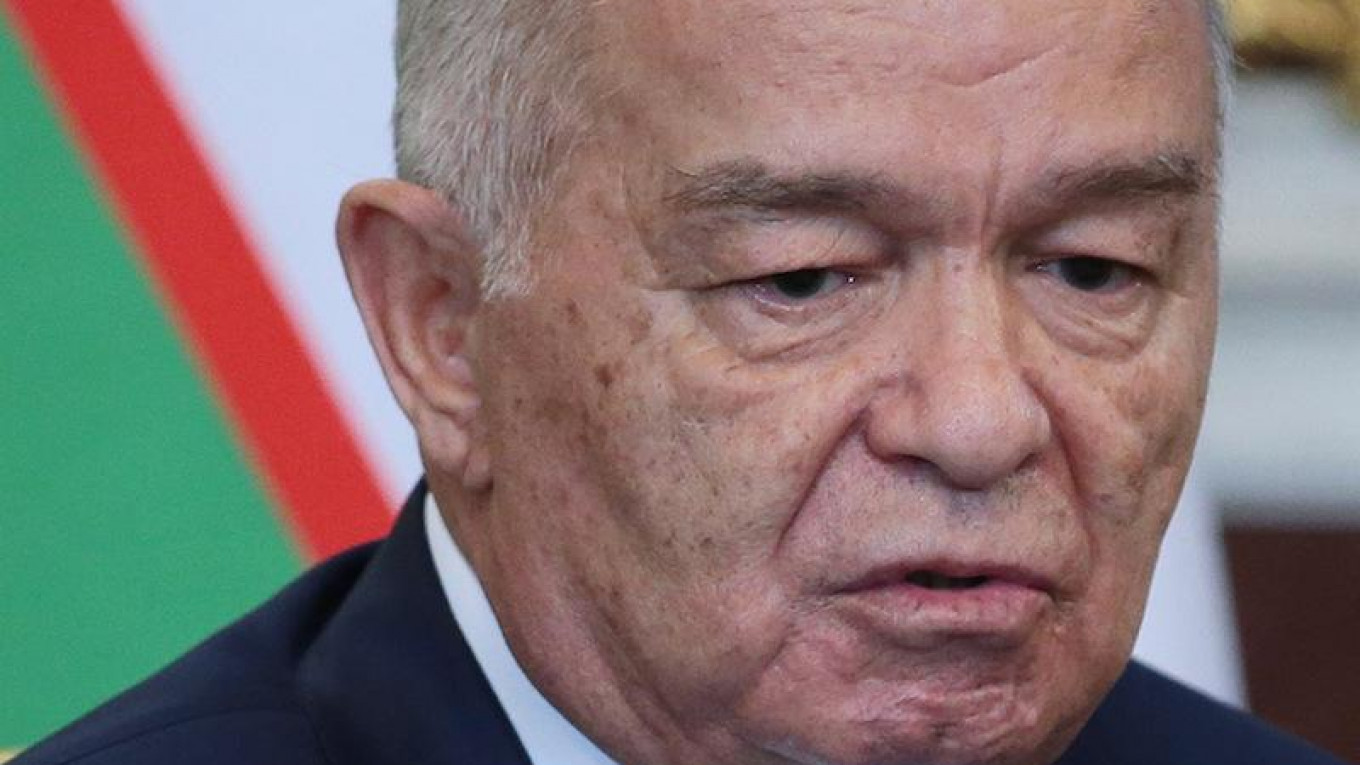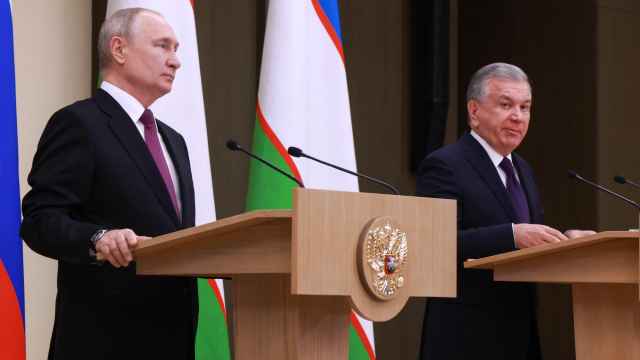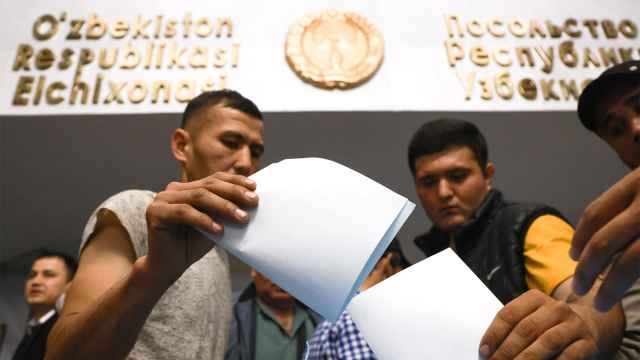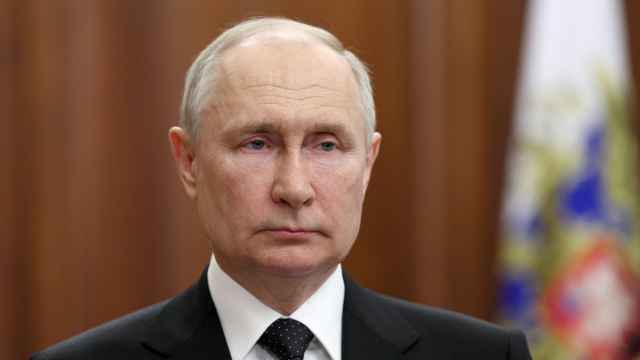The President of Uzbekistan, Islam Karimov, has died, the Fergana news agency reported Monday night, citing unidentified sources.
Officials in Tashkent have denied the reports, claiming that Karimov is in a "serious but stable condition," according to the Interfax news agency.
Rumors over the fate of longtime Uzbek President Islam Karimov began following reports of his hospitalization on Monday morning. The president was last seen publicly on state television on Aug. 17 and had been expected to appear at Independence Day celebrations in the Uzbek capital of Tashkent on Sept. 1, marking 25 years since the country’s independence from the Soviet Union.
His youngest daughter, Lola, later posted a short statement on Facebook. Karimov, 78, was “in intensive care,” she said, after having suffered a brain hemorrhage. His condition was “stable,” the daughter wrote, but it was “too early to make any forecasts.”
According to sources of the opposition People’s Movement of Uzbekistan, Karimov fainted following a reception he had thrown for the country’s Olympic team on Friday evening. During the reception he had “drunk too much vodka,” and “ignored warnings” from one of his aides. The reception reportedly ended at around 10 p.m. after which the president is said to have lost consciousness. He was hospitalized and doctors from Germany and Israel were reportedly flown into the capital Tashkent.
Undisputed Leader
In 27 years in power, Karimov built a heavy-handed authoritarian regime that rendered him undisputed leader. He became leader of the Uzbek Soviet Socialist Republic in 1989, and remained in his post after the country gained its independence from the Soviet Union in 1991.
Karimov suppressed all the opposition in his country. In Uzbekistan, thousands of opposition activists from the Islamist party Khizbut Takhrir were jailed, and thousands fled to Russia, says Alexei Malashenko from the Carnegie Moscow Center think-tank. In May 2005, hundreds were estimated to have been killed when Uzbek military forces crushed a revolt in the city of Andizhan in eastern Uzbekistan.
A recent report from Human Rights Watch drew attention to the most obvious excesses of the regime. “Thousands of people are imprisoned on politically motivated charges, torture is endemic, and authorities regularly harass human rights activists, opposition members, and journalists,” it said. Reporters Without Borders posted a similarly negative review of Karimov’s Uzbekistan, ranking the country 166 out of 180 in this year’s index of press freedom.
Today is not the first time Karimov’s health has become a matter of concern. In the past six years, he is reported to have suffered a heart attack and slipped into a coma twice.
What Next?
Karimov’s death will leave a chasm in Uzbek politics, and there has been much speculation that a struggle over succession could add to instability in the region. The likelihood, however, is that ruling clans will come to an agreement to ensure the regime’s survival. The regime “can easily replicate itself,” says Daniil Kislov, editor-in-chief of the Fergana.ru website.
One person highly unlikely to take up the post is Gulnara Karimova, the leader’s famous daughter. A designer, socialite and business woman, she has been pushed out of the political elite and faces corruption charges in the United States and in the Netherlands over hundreds of millions of dollars.
Karimova was put under house arrest in Tashkent, apparently on the orders of Rustam Inoyatov, the head of the Uzbek National Security Service (SNB) and major Uzbekistan power broker. “Inoyatov doesn’t want to rule Uzbekistan himself. But you can’t find your way to the top in Uzbekistan without his sanction,” says Malashenko.
Both Kislov and Malashenko agree the most likely candidate for Karimov’s succession is the current prime minister Shavkat Mirziyayev. “In Uzbekistan, a lot — even more than in Russia — is determined by the security services,” Kislov says. “Mirziyayev comes from the SNB, he’s also very close to the president’s family, especially his influential wife, so if he replaces Karimov, little would change.”
Andrei Grozin, Middle Asia expert of the CIS Countries Institute, however, suggests the deputy prime minister Rustam Azimov is another possible successor. “Whoever is next, it will be someone from Karimov’s inner circle, someone eager to keep in place the existing establishment,” the expert adds.
Analysts said the Uzbek political elite fears destabilization and will work hard to avoid it. If the transition of power goes wrong, that will be the moment when different groups of influence might appeal to Islamist oppositionists in Russia and Afghanistan. “At the moment it doesn’t look likely, though no one ever knows for sure when it comes to Afghanistan,” Malashenko says.
There are many unknowns when it comes to the future president himself. “As you have seen, Lola has asked to respect the president’s ’privacy’ in her Facebook post,” says Kislov. “There will be no [official] news on his condition until it turns for the better or for the worse. In the meantime, while he is still alive, speculating on who is going to replace him will remain a strict taboo.”
Rumors of Karimov dying have repeatedly resurfaced for the past decade. Every time in the past, however, the president has confounded predictions of his demise: “Modern elite medicine works miracles,” says Grozin. “You never know — maybe he’ll spend a while in hospital and surprise everyone by returning from the dead.”







